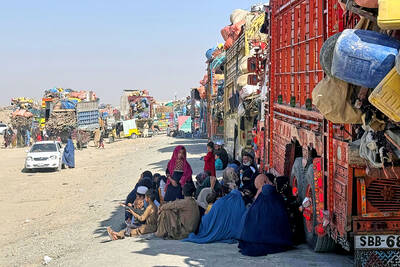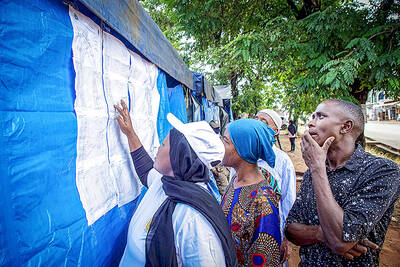A gang of pirates attempted to board a huge Japanese-owned crude oil tanker in the Singapore Strait in the latest of a series of attacks on the region's strategically important shipping lanes, a maritime official said yesterday.
"Pirates in seven small fishing boats surrounded the tanker and attempted to board it late Tuesday," Noel Choong, head of the Piracy Reporting Centre of the International Maritime Bureau (IMB) told reporters.
The 150,000 tonne Yohteisan was on an east-bound journey in heavy rain and poor visibility when the incident ocVcurred off Indonesia's Karimun islands, where the southern tip of the Malacca Strait joins the Singapore Strait.
Choong said the captain of the Panama-registered tanker took evasive measures and increased speed to escape the attackers.
All the crew members were safe and the tanker continued on its journey, he said, adding that a successful boarding of a tanker of this size in the narrow sea lane could have had disastrous consequences.
"Anything could have happened. Singapore of course will take this attack seriously," Choong said.
The foiled raid comes after four pirate attacks on ships in the Malacca Strait in the past six weeks, which have added to concerns that armed extremists could hijack a tanker to use as a floating bomb or to block the vital channel and disrupt world trade.
On April 1, the 26,014 tonne Japanese-owned bulk carrier Ocean Bridge was attacked before dawn by pirates armed with guns and knives who robbed the ship's safe of its cash before fleeing.
On March 14 a Japanese tugboat was boarded by armed men who kidnapped the captain and two crew members. They were freed a week later.
Two days earlier a gang of 35 pirates armed with machine guns and rocket launchers boarded an Indonesian gas tanker and kidnapped the captain and chief engineer. They were released after a ransom was paid.
On Feb. 28, a Malaysian tugboat was attacked.
The chief engineer was shot in the leg and the captain and chief officer were kidnapped, but later freed.
The narrow, 960km-long Malacca Strait, bordered by Malaysia, Singapore and Indonesia, is used by about 50,000 ships a year carrying one-third of world trade and half of the world's oil supplies.
The three nations last year began coordinated patrols in the strait, which is one of the world's top piracy blackspots.
But with the recent increase in attacks, Malaysia has announced it will also place armed and uniformed police officers on board tugboats and barges plying the waterway.
Malaysia has, however, rejected suggestions that the US or other foreign navies be allowed to help patrol the strait.

With much pomp and circumstance, Cairo is today to inaugurate the long-awaited Grand Egyptian Museum (GEM), widely presented as the crowning jewel on authorities’ efforts to overhaul the country’s vital tourism industry. With a panoramic view of the Giza pyramids plateau, the museum houses thousands of artifacts spanning more than 5,000 years of Egyptian antiquity at a whopping cost of more than US$1 billion. More than two decades in the making, the ultra-modern museum anticipates 5 million visitors annually, with never-before-seen relics on display. In the run-up to the grand opening, Egyptian media and official statements have hailed the “historic moment,” describing the

‘CHILD PORNOGRAPHY’: The doll on Shein’s Web site measure about 80cm in height, and it was holding a teddy bear in a photo published by a daily newspaper France’s anti-fraud unit on Saturday said it had reported Asian e-commerce giant Shein (希音) for selling what it described as “sex dolls with a childlike appearance.” The French Directorate General for Competition, Consumer Affairs and Fraud Control (DGCCRF) said in a statement that the “description and categorization” of the items on Shein’s Web site “make it difficult to doubt the child pornography nature of the content.” Shortly after the statement, Shein announced that the dolls in question had been withdrawn from its platform and that it had launched an internal inquiry. On its Web site, Le Parisien daily published a

‘NO WORKABLE SOLUTION’: An official said Pakistan engaged in the spirit of peace, but Kabul continued its ‘unabated support to terrorists opposed to Pakistan’ Pakistan yesterday said that negotiations for a lasting truce with Afghanistan had “failed to bring about a workable solution,” warning that it would take steps to protect its people. Pakistan and Afghanistan have been holding negotiations in Istanbul, Turkey, aimed at securing peace after the South Asian neighbors’ deadliest border clashes in years. The violence, which killed more than 70 people and wounded hundreds, erupted following explosions in Kabul on Oct. 9 that the Taliban authorities blamed on Pakistan. “Regrettably, the Afghan side gave no assurances, kept deviating from the core issue and resorted to blame game, deflection and ruses,” Pakistani Minister of

UNCERTAIN TOLLS: Images on social media showed small protests that escalated, with reports of police shooting live rounds as polling stations were targeted Tanzania yesterday was on lockdown with a communications blackout, a day after elections turned into violent chaos with unconfirmed reports of many dead. Tanzanian President Samia Suluhu Hassan had sought to solidify her position and silence criticism within her party in the virtually uncontested polls, with the main challengers either jailed or disqualified. In the run-up, rights groups condemned a “wave of terror” in the east African nation, which has seen a string of high-profile abductions that ramped up in the final days. A heavy security presence on Wednesday failed to deter hundreds protesting in economic hub Dar es Salaam and elsewhere, some